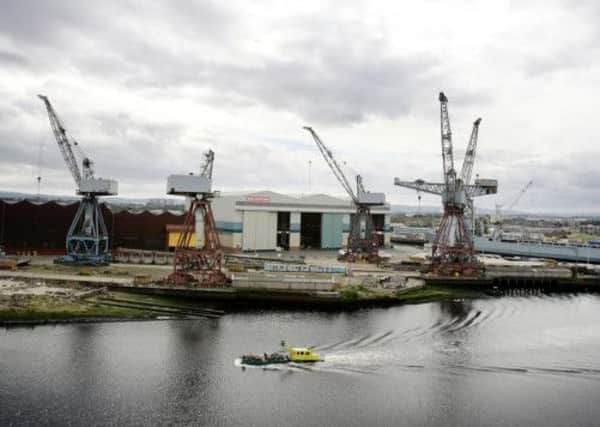Leaders: Shipyard jobs must be saved


The threat of job losses at BAE Systems’ Govan and Scotstoun shipyards is desperately worrying for thousands of families on Clydeside, and Scottish engineering more widely.
The firm’s plans are said to involve all its British yards, and at this stage exactly how many jobs may go in Scotland is unknown. But the mood last night among all interested parties was sombre. John Swinney – the Scottish Government’s Cabinet secretary for finance, employment and sustainable growth – is seeking clarification on the scale of Scottish losses. That cannot come too soon.
Advertisement
Hide AdAdvertisement
Hide AdIt is dismaying, however, to see this threat to shipyard workers so quickly picked up and used as a political weapon in the ongoing independence referendum campaign.
Elements of both the Yes and No campaigns have been attempting to use the threatened job losses to support their analysis about Scotland’s future.
Better Together supporters suggest the yards would be safer if the prospect of independence was not hanging over them. Yes Scotland supporters suggested that Unionist politicians’ dark warnings about independence are in danger of becoming a self-fulfilling prophesy.
Not only is this distasteful while the details are still sketchy and workers are still in the dark, it also shows what a bubble these politicians live in.
Not everything that happens in Scotland – or further afield, for that matter – requires us to view it through the distorting prism of Scotland’s constitutional choices.
Of course, the vote in September next year is historic and momentous. Of course, it will shape this country for generations to come. But the world has not stopped spinning on its axis because we are in the middle of a referendum campaign. Economic and commercial forces are still operating across the globe irrespective of our deliberations. And when these global forces have an impact on our country and its workers, we should have the intelligence to treat then intelligently on their own terms, and not try to shoehorn them into our own squabbles.
Over the course of the Grangemouth saga, the behaviour of senior Scottish politicians was exemplary. Alex Salmond, John Swinney and Alistair Carmichael, the Secretary of State for Scotland, put constitutional niceties aside as they co-operated to seek a secure future for the plant. Only after it was saved did referendum hostilities recommence.
It would be heartening if both sides of the divide were to adopt a self-denying ordinance on how the shipyard threat plays into their referendum narratives. This is another occasion when the country has to come together.
Pause for thought on legal change
Advertisement
Hide AdAdvertisement
Hide AdIt is hard to think of anyone with a more impressive pedigree in Scots law than Lord Hope of Craighead. A former Lord Justice General and Lord President of the Court of Session, he later became a law lord and then held one of the most senior posts in the UK Supreme Court. So when he expresses concern about the future of the law in Scotland, we would do well to listen.
And when he suggests proposed changes could have consequences that are “absolutely fundamentally wrong”, that is when we too might be justified in being concerned.
Lord Hope’s target is the planned scrapping of the need for corroboration in Scottish criminal prosecutions. The Scottish Government argues this is a necessary reform to make Scots law compatible with European human rights legislation. Ministers have accepted the arguments of Lord Carloway, the Lord Justice Clerk, that such a move is essential if the law in Scotland is to be fit for purpose in the 21st century.
However, many of Lord Carloway’s judicial colleagues disagree, and sceptics have now been joined by perhaps the biggest hitter of them all.
It is now clear that if Kenny MacAskill, the justice secretary, wants to scrap corroboration he is going to have to do it in the face of opposition from much – perhaps most – of the Scottish legal establishment.
Many people will urge him on, not least those campaigning for better justice for rape victims. But as Lord Hope asks, is there not a different way to produce more satisfactory outcomes in these cases than to scrap centuries of practice and jurisprudence?
Perhaps we need to pause and consider whether this is indeed the right way forward.